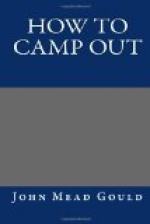The most successful marching that I witnessed in the army was done by marching an hour, and resting ten minutes. You need not adhere strictly to this rule: still I would advise you to halt frequently for sight-seeing, but not to lie perfectly still more than five or ten minutes, as a reaction is apt to set in, and you will feel fatigued upon rising.
Experience has shown that a man travelling with a light load, or none, will walk about three miles an hour; but you must not expect from this that you can easily walk twelve miles in four heats of three miles each with ten minutes rest between, doing it all in four and a half hours. Although it is by no means difficult, my advice is for you not to expect to walk at that rate, even through a country that you do not care to see. You may get so used to walking after a while that these long and rapid walks will not weary you; but in general you require more time, and should take it.
Do not be afraid to drink good water as often as you feel thirsty; but avoid large draughts of cold water when you are heated or are perspiring, and never drink enough to make yourself logy. You are apt to break these rules on the first day in the open air, and after eating highly salted food. You can often satisfy your thirst with simply rinsing the mouth. You may have read quite different advice[8] from this, which applies to those who travel far from home, and whose daily changes bring them to water materially different from that of the day before.
It is well to have a lemon in the haversack or pocket: a drop or two of lemon-juice is a great help at times; but there is really nothing which will quench the thirst that comes the first few days of living in the open air. Until you become accustomed to the change, and the fever has gone down, you should try to avoid drinking in a way that may prove injurious. Base-ball players stir a little oatmeal in the water they drink while playing, and it is said they receive a healthy stimulus thereby.
Bathing is not recommended while upon the march, if one is fatigued or has much farther to go. This seems to be good counsel, but I do advise a good scrubbing near the close of the day; and most people will get relief by frequently washing the face, hands, neck, arms, and breast, when dusty or heated, although this is one of the things we used to hear cried down in the army as hurtful. It probably is so to some people: if it hurts you, quit it.
FOOT-SORENESS AND CHAFING.
After you have marched one day in the sun, your face, neck, and hands will be sunburnt, your feet sore, perhaps blistered, your limbs may be chafed; and when you wake up on the morning of the second day, after an almost sleepless night, you will feel as if you had been “dragged through seven cities.”
I am not aware that there is any preventive of sunburn for skins that are tender. A hat is better to wear than a cap, but you will burn under either. Oil or salve on the exposed parts, applied before marching, will prevent some of the fire; and in a few days, if you keep in the open air all the time, it will cease to be annoying.




